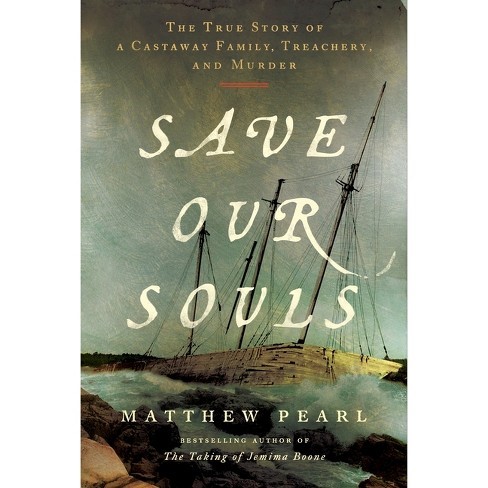Book Review
“SAVE OUR SOULS” By Matthew Pearl
Reviewed Steven G. Kellman
Survival in the North Pacific
In Johann Davis Wyss’s novel Swiss Family Robinson (1812), William, Elizabeth, and their four sons are shipwrecked on an idyllic island in the East Indies. They learn important lessons about resourcefulness, cooperation, and faith, and the experience is so positive that when, ten years later, a British ship finally drops anchor offshore, a few members of the family choose to stay. Isolation is a seductive fantasy – far from the madding crowd, sipping coconut milk and reading a favorite book while lounging on a tropical beach.

However, most desert islands are not especially hospitable, and being stuck on one could soon make you yearn for the dense company of Manhattan or even Riker’s Island. When a plane crash strands a group of British schoolboys in William Golding’s Lord of the Flies (1954), they discover that human nature is vicious and that life lived in nature is, as Thomas Hobbes warned, “nasty, brutish, and short.” In the 2015 film The Martian, Matt Damon finds himself marooned on a barren planet struggling to survive without a reliable source of food or oxygen.
Matthew Pearl invented stories around historical figures for his popular novels The Dante Club (2003), The Poe Shadow (2007), and The Last Dickens (2009). However, his latest book, Save Our Souls, sticks to the facts of an astonishing case of castaways, a family that managed to survive fourteen months in a remote spot of the North Pacific. In 1887, the British family Walker – Frederick and Elizabeth, their teenage sons Freddy, Charlie, and Henry, and their dog Jessie – were shipwrecked on Sand Island, a desolate plot of land far from civilization. Part of the Midway Atoll, it is 3,200 miles west of San Francisco and 4,200 miles east of Hong Kong. Devoid of vegetation, Sand Island is only about 1.5 miles long and three-quarters of a mile wide.
Frederick Walker was captain of the Wandering Minstrel, a fishing schooner that was wandering the high seas in search of sharks when a typhoon smashed the ship. When the Walkers and their crew of 24 take refuge on bleak Sand Island, they discover an emaciated Dane already living there – Hans Jorgensen, who, they eventually learn, had been abandoned after murdering two of his shipmates. He soon makes common cause with Frederick’s first mate, John Cameron, an incompetent, cowardly, and homicidal sailor. The harrowing experience on this desert island will have much more in common with Lord of the Flies than any fantasy of tropical serenity.
In this first book-length account of the shipwreck of the Wandering Minstrel, Pearl draws on government records and journalistic reports. He is able to construct a plausible – and grim – transcription of what occurred in a world, pre-internet and pre-radio, in which silence suffuses the vast expanses of the planet. However, lacking direct access to the principals, Pearl is unable to get inside the minds of the castaways. The crew members, who remained aloof from and even hostile toward the Walkers, are an undifferentiated mass. Dialogue could not be verified and is minimal. How exactly was daily existence felt? Pearl fills in with background information about navigating the Pacific in the 19th century and what authorities in Honolulu, San Francisco, and Hong Kong were doing. However, it is up to the reader to imagine – as a novelist would – what it was like trying to subsist on birds, eggs, fish, and hope.
At the conclusion of his extraordinary story of endurance, Pearl notes: “The most enduring mystery, though, might remain the one that the castaways themselves confronted at the time: whether people torn from civilization and forced to rebuild their world from virtually nothing survive by turning against or toward each other.” The haunting answer Pearl provides is: Both.
————————————————————————————————————–
Save Our Souls by Matthew Pearl; Harper; 2025; $30.00
